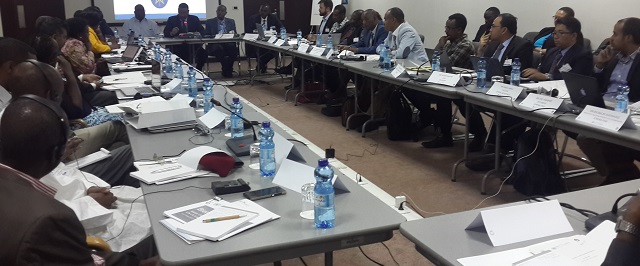Leveraging education to enhance literacy and support national climate goals

Addis Ababa, 15 March, 2017 (ECA) An international three-day workshop to design and implement systematic, results-oriented climate change learning strategies at national level was officially opened by the Ethiopian Minister of Environment, Forests and Climate Change, Kare Chawicha, here today
The meeting, co-organized by the Secretariat of the UN CC:Learn partnership (hosted by UNITAR) , the United Nations Economic Commission of Africa (UNECA) and the University of Addis Ababa aims to provide an opportunity for countries to discuss challenges and lessons encountered in the development and implementation of their climate change learning strategies; exchange experiences on how to integrate climate change in the general education system and; jointly explore opportunities for resource mobilization for strategy implementation.
Minister Chawicha told the meeting that awareness creation and capacity building for Ethiopia’s Climate Resilient Green Economy Vision and Strategy, the blueprint for limiting greenhouse gas emissions, building resilience to climate change and accelerating economic growth, was taking place at all levels throughout the country and that the involvement of the education sector is “fundamental in building climate literate citizens and to attain our ambitious objectives.
He noted that with one tenth of Ethiopia’s population currently in formal education, half a million teachers and 35 000 schools, leveraging the education system to build climate change literacy in every household was possible.
James Murombedzi, Acting Coordinator, ECA Africa Climate Policy Center said “Climate change is at the core of development processes and pursuant to the implementation of the Paris Agreement through the Nationally Determined Contributions (NDCs) new forms for understanding and engaging on climate change issues are necessary.
He said, that the ACPC was committed to being a climate knowledge hub and would continue to actively seek and formalize knowledge partnerships with organizations with a footprint in Africa.
Participants attending the workshop represent the nine UN CC:Learn partner countries; Benin, Burkina Faso, Dominican Republic, Ethiopia, Ghana, Indonesia, Malawi, Niger and Uganda.
About UN CC:Learn
UN CC:Learn is a partnership of more than 30 multilateral organizations supporting countries to design and implement systematic, recurrent and results-oriented climate change learning. At the global level, the partnership supports knowledge-sharing, promotes the development of common climate change learning materials, and coordinates learning interventions through a collaboration of UN agencies and other partners. At the national level, UN CC:Learn supports countries in developing and implementing national climate change learning strategies. Through its engagement at the national and global levels, UN CC:Learn contributes to the implementation of Article 6 of the UNFCCC on training, education and public awareness-raising, and the 2012-2020 Doha Work Programme. Funding for UN CC:Learn is provided by the Swiss Government and UN partners. The Secretariat for UN CC:Learn is hosted by the UN Institute for Training and Research (UNITAR).
for more information UN CC:Lear Official Website
Issued by:
Communications Section
Africa Climate Policy Center, ECA
PO Box 3001
Addis Ababa
Ethiopia
E-mail: ecainfo@uneca.org
- Log in to post comments


